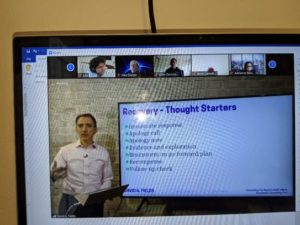Recently, I was to attend a two-day consultant’s workshop in New York City put on by David A. Fields. David is a consultant to consultants, and I was excited to sit in a room with other consultants to learn from him and from them.
But, alas, the in-person workshop was cancelled, and David forged ahead with a virtual two-day meeting in its place.
David did not disappoint! He did such a great job transforming his in-person workshop to virtual I was inspired to write this.
I’m sure David has a lot of his own ideas on this topic, but from my perspective as a student here were the 7 things David did that made his transition successful.
- Sent a box of stuff. A week before the workshop, David sent a box with the training binder we would’ve received in NYC, a book (value-add), a high-quality headset so we’d all have great sound, and two boxes of chocolates. The chocolates emulated the bowls of candy laying around at these types of events and I thought it was a nice touch.
- Stood up next to his slides, rather than shared his slides from his computer. It was a subtle move on his part, but I kept thinking about how brilliant it was. I just haven’t seen much of that at all, and while he already stood out as an expert, he does even more so now.

- Had a team to help with logistics. Zoom has a lot of cool features, such as breakout rooms, and David was also moving between two cameras so that he could either have the screen next to him or not. He had at least two people that I know of helping him manage all the technical stuff. This way he could focus solely on teaching us and facilitating good conversation.
- We used the breakout rooms regularly, and had different people in each breakout. All throughout the training we were in different groups, which gave us a chance to learn from everyone. And, where it made sense for the exercise, we switched groups several times. In one breakout, for example, we had 5 minutes with a team member and then were moved, had 5 minutes with someone new and then were moved, and so forth.
- Used a timer. For every break and breakout session, David used a timer. It was up on the screen and when it hit 0, he was right back on track. David knew he had two days of content to get through, and he stayed on track to be sure it was all covered.
- Speaking of breaks, we took them often. In addition to the lunch break, we took several 5-minute breaks all throughout the day to stretch our legs. This was helpful to keep the blood flowing and avoid information overload.
- Monitored and commented on the group chat. One of my favorite parts of this virtual training was the group chat. As David was hitting some point or answering someone’s question, naturally we were all adding in our two cents. (We’re consultants, what can I say?) Valuable learning nuggets were shared there and David often pointed them out, added to them, or posed a question back to the group.
- Treated it like a conversation. We’ve all attended webinars with Q&A strictly at the end. While I understand the presenter is worried about time, a good presenter will make time for questions throughout. It builds rapport and makes the webinar way more engaging. David took questions whenever someone had one, just like he would’ve in person.
Of course, the group in the training affects its success. The group of consultants I met were amazing, and I look forward to building the friendships I formed over those two-days.
Let us know what your tips are for converting training to virtual! We’d love to do a Part 2 of this blog post.
Sincerely,
Catherine
_____________________
DON’T FORGET THESE RESOURCES!
- Discuss your unique challenges with a group of HR professionals, leaders, and business owners. We’re all here to help each other out. Register here.
- Online harassment prevention training. Your employees still need training by Dec 31, 2020. Sign them up here. We’ll be adding dates throughout the year.



